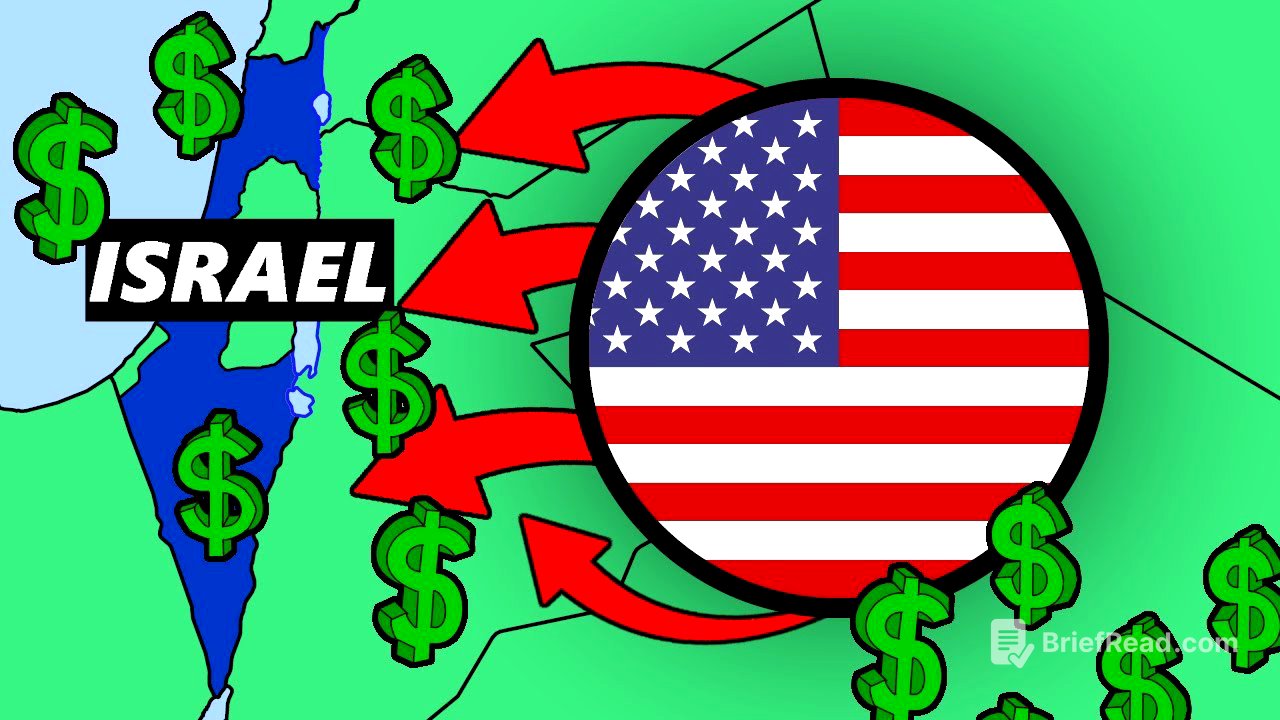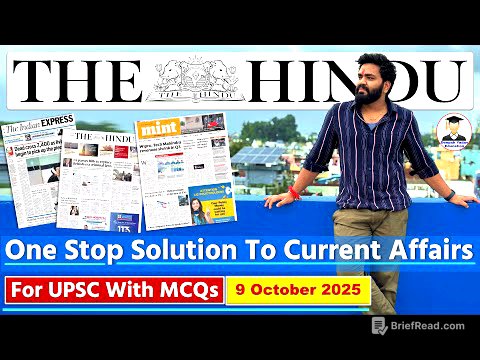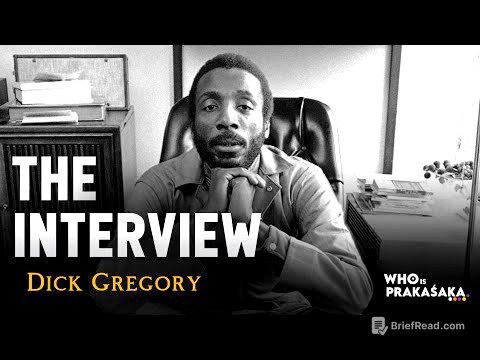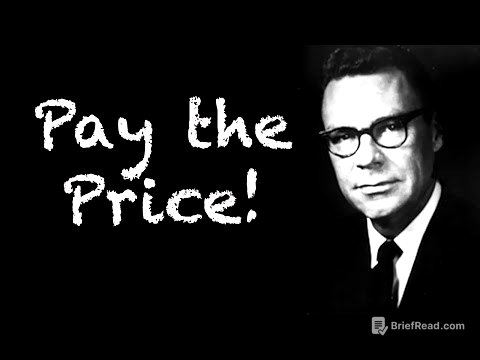TLDR;
This video explores the complex history of the relationship between the United States and Israel, focusing on the political pressures, strategic considerations, and key events that have shaped this dynamic from 1948 to the early 2000s. It examines the influence of the Israel Lobby, the internal conflicts within US administrations, and the impact of these factors on US foreign policy in the Middle East.
- The video highlights the early tensions between the Truman administration and the State Department over the recognition of Israel, influenced by figures like Clark Clifford and George C. Marshall.
- It details the rise of the Israel Lobby and its impact on US policy, particularly during the Kennedy and Johnson administrations.
- The video also covers critical events such as the 1967 Six-Day War, the USS Liberty incident, and the Yom Kippur War, examining how these events further shaped the US-Israel relationship.
Introduction [0:01]
The video begins with a personal appeal from the creator for viewers to support the channel through subscriptions, Patreon memberships, or donations.
The Truman Administration and the Recognition of Israel [0:35]
In 1948, a debate within the Truman administration centered on whether to recognize the new Jewish state in Palestine. The State Department, led by George C. Marshall, opposed recognition, while domestic advisor Clark Clifford advocated for it. Truman revered Marshall, but they clashed over Middle East policy, threatening to split the administration. Marshall and his "wise men" opposed recognizing the Jewish state. Clifford noted the State Department undermined Truman's support for partition by reversing its UN delegation's position without informing the President, leading to Truman's outrage. Despite his annoyance, Truman didn't override the State Department to avoid a crisis with Marshall.
The Spirited Debate and Marshall's Opposition [3:47]
During a meeting on May 12th, 1948, Clifford urged Truman to promptly recognize the Jewish state after the British mandate ended. Marshall exploded, questioning Clifford's presence and accusing him of pressing political considerations. Marshall threatened to vote against Truman if he followed Clifford's advice, stunning everyone. Marshall documented his opposition in a top-secret memorandum, arguing Clifford's advice was based on domestic politics, diminishing the presidency's dignity. Marshall's opposition stemmed from representing the State Department and the US military leadership.
The Joint Chiefs of Staff's Concerns [7:15]
The Joint Chiefs of Staff (JCS) issued 16 papers on Palestine, predicting the Zionist strategy would involve the US in operations to secure Jewish objectives, including sovereignty over Palestine, unlimited immigration, and expansion into neighboring territories. Clark Clifford maintained close contact with Eliyahu Epstein, the Jewish Agency representative, gaining information beyond the State Department's pro-Arab bias.
The Rise of the Israel Lobby [9:16]
The American special relationship with Zionism began at the Biltmore Hotel meeting in 1942, where American Zionists pledged that Palestine be constituted as a Jewish Commonwealth and called for unrestricted Jewish immigration. This meeting marked the birth of the Israel Lobby. By 1944, the lobby's influence on Congress was evident through telegrams, calls, and letters. The American Zionist Emergency Council (AZEC) secured endorsements from both Republican and Democratic parties, including Franklin D. Roosevelt's Democratic party platform favoring unrestricted Jewish immigration and colonization in Palestine.
Truman's Sympathies and Political Considerations [11:26]
In August 1945, President Harry Truman expressed his desire to allow as many Jews as possible into Palestine, influenced by his horror at the Holocaust, belief in the Balfour Declaration, and biblical interpretations. However, Under Secretary of State Will Clayton noted the pressure from Zionist groups and warned against yielding to their demands, as it would encourage future pressure. The Joint Chiefs of Staff also urged Truman to avoid actions that might alienate the Arab world, given the US's vital security interests in the Middle East.
Political Pressures and the Decision to Recognize Israel [13:36]
A 1968 interview with Truman's White House appointment secretary, Matthew J. Connelly, revealed that the decision to recognize Israel was influenced by humanitarian reasons and political considerations. Connelly admitted that he raised the question with Truman about the number of Arab votes in the US and the source of the Democratic Party's financing, implying the importance of Jewish support. David Niles, a political analyst, was also a key figure in this decision. Truman acknowledged the immense pressure and propaganda aimed at the White House by Zionist leaders.
The 1948 War and Zionist Expansion [16:21]
The 1948 war in Palestine resulted in a human tragedy, with Zionist forces implementing Plan D, systematically destroying hundreds of villages. Israeli historian Benny Morris described the plan as clearing hostile forces. David Ben-Gurion aimed to use any partition plan to take over all of Palestine. By 1949, around 750,000 Palestinians were displaced, and Israel implemented a free-fire policy against those attempting to return. The Zionists overwhelmed Arab armies and formed a secret pact with Jordan.
Post-War Negotiations and Israeli Intransigence [18:39]
By the time of the 1949 Armistice talks, Israel was in a comfortable negotiating position due to the Arab states' defeat. Mark F. Ethridge, chairman of the UN Conciliation Commission for Palestine, noted the Arab concessions and Israeli intransigence. Israel's refusal to address the refugee problem led to animosities between the White House and the Jewish State. Michael Hoffman reported that Israel was on the wrong side of almost every issue in the eyes of world opinion, occupying territory assigned to Arabs, encouraging Jewish immigration, and rejecting responsibility for displaced Palestinians.
US Diplomatic Pressure and Israeli Response [20:41]
Israel responded to US diplomatic pressure by deploying the Israel Lobby. A top-secret memo from May 27th summarized Israel's territorial demands, including portions of Lebanon, the Gaza Strip, and territory from Transjordan, while retaining occupied areas. The US government supported territorial compensation for acquisitions beyond the 1947 partition resolution and urged refugee repatriation, but Israel refused. Israeli officials intended to change the US government's position through means available in the US, including the threat of force.
Failed Attempts to Hold Israel Accountable [23:11]
The State Department believed it was time to make a basic decision about the US attitude toward Israel, suggesting that if Israel continued to reject friendly advice, the US would revise its attitude, including withholding financial aid. However, this course of action was expected to arouse strong opposition in American Jewish circles. Truman suspended $49 million of an export-import loan but restored the funding due to pressure from the lobby, abandoning attempts to force a settlement or accommodate Palestinian refugees.
The American Zionist Council and Eisenhower's Opposition [25:43]
The American Zionist Council (AZC) replaced the American Zionist Emergency Council in 1949. In 1951, the AZC retained Isaiah Sai Kenan to secure US economic assistance for Israel. Truman's successor, Dwight Eisenhower, provided the first serious obstacle to the lobby. Eisenhower, a military figure, carefully considered the Middle East due to its proximity to the Soviet Union and its oil resources.
Eisenhower's Assessment and the 1953 National Intelligence Estimate [26:51]
The 1953 National Intelligence Estimate highlighted that US association with Israel was a continuing irritant in US-Arab relations and a major obstacle to US influence in the Middle East. The Arab world believed the US was responsible for Israel's establishment, interpreting it as anti-Arab imperialism. The US faced the dilemma that Israel could not survive without foreign aid, but aid to Israel deepened Arab resentment. The estimate concluded that the Arab-Israeli dispute damaged the US security position in the Middle East.
Renewed Hostilities and the Massacre at Qibya [28:46]
The National Intelligence Estimate was concerned with renewed hostilities. While 200 Zionist settlers died from Arab attacks between 1949 and 1956, Zionist forces killed as many as 5,000 Arabs. The massacre at Qibya exemplified the period's indiscriminate murders. Colonel Ariel Sharon's Commando Unit 101 killed 69 people, mostly women and children, in response to an attack that killed an Israeli mother and her two children.
CIA's Anti-Zionist Efforts and the Lavon Affair [30:18]
Zionism was so detrimental to US foreign policy that the CIA illegally organized and funded an anti-Zionist lobby, the American Friends of the Middle East (AFME), to counter the Israel Lobby. The AFME's Stateside operation made CIA funding illegal under the National Security Act of 1947. During Moshe Sharett's brief tenure as prime minister, the Lavon Affair saw Zionist operatives plant bombs in Western targets in Egypt as a false flag operation to be blamed on the Muslim Brotherhood.
Operation Black Arrow and the Suez Crisis [32:13]
In February 1955, David Ben-Gurion returned to government as Minister of Defense. The Israeli Army launched Operation Black Arrow, a deadly cross-border raid into Egyptian-held Gaza, killing 40 soldiers. This occurred when the State Department was trying to improve relations with Egypt. Nasser cited this raid as the reason for signing an arms deal with Czechoslovakia in September 1955. Nasser nationalized the Suez Canal Company in July 1956, leading Britain and France to seek war, offering weapons to Israel for assistance.
The Suez Crisis and Eisenhower's Response [34:09]
The US halted arms shipments to Israel in response to the Suez Crisis. The American Zionist Council produced a letter to Congress asking for arms to Israel. Secretary of State John Foster Dulles caved to the pressure, giving Israel weapons. Israel captured Gaza and the Sinai Peninsula with the assistance of France and Britain, enraging Eisenhower. Eisenhower forced Israel to withdraw via threats of cutting off aid and diplomatic support.
US Concerns and the Joint Chiefs of Staff's Memorandum [36:17]
John Foster Dulles told Golda Meir that Israel's actions in Egypt had deferred the possibility of good relations with the Arabs for a generation. The Joint Chiefs of Staff expressed great concern over the political-military situation in the Middle East, stemming from the unresolved Arab-Israeli problem. They emphasized the need to fix Israel's boundaries, guarantee that Israel would not expand territorially, and settle the refugee problem.
The 1960s: The Israel Lobby's Growth and Kennedy's Policies [37:20]
The 1960s saw the Israel Lobby grow to its full potential, much of it during John F. Kennedy's presidency. Mike Feldman, a deputy special counsel to the president, acted as a member of the Israel Lobby inside the White House. A May 1963 memo revealed that the White House was under increasing domestic political pressure to adopt a foreign policy more aligned with Israeli desires. Kennedy broke the barrier on direct advanced weapons shipments to Israel, sending them Hawk missiles.
Kennedy's Failed Strategies and Israeli Defiance [38:54]
Kennedy hoped to settle the refugee question and prevent Israel from pursuing nuclear weapons. However, Israel defied Kennedy on both fronts. David Ben-Gurion expressed appreciation for the Hawk missiles but rejected settling the refugee crisis. Israel developed an arsenal of nuclear weapons, stealing hundreds of pounds of highly enriched uranium from a facility in Apollo, Pennsylvania.
Nasser's Peace Efforts and McCloy's Account [45:15]
Despite Israel's actions, Egypt sought peace with Israel. John J. McCloy recounted a meeting with Kamal Abdul Nasser in Cairo in June 1963, where Nasser stated he had no intention of engaging in nuclear weapons or attacking Israel. Nasser detailed Israeli attacks and the refusal of Western powers to provide him with weapons, leading him to appeal to the Russians.
Lyndon B. Johnson and the Israel Lobby [47:15]
Lyndon B. Johnson, like Truman, had a fundamentalist background and a strong belief in supporting Israel. He continued Kennedy's cabinet and allowed Mike Feldman to continue serving as his prime minister on the question of Israel. Johnson practically gave in completely to the lobby, even stating that he would leave the decision on US arm sales to Jordan up to the Israelis and the lobby.
Johnson's Struggles and the American Israel Public Affairs Committee (AIPAC) [49:50]
Despite Johnson's friendliness with the Israelis, the lobby's pressure reached such great heights that he asked Aba Aben to tell them to stop interfering. Johnson still had to consider US positions and interests, which were starkly opposed to Israeli interests. The American Zionist Council was ordered to register as a foreign agent in December 1962. In response, Sai Kennan incorporated the American Israel Public Affairs Committee (AIPAC) to avoid registering as a foreign agent.
AIPAC's Influence and the Sale of Offensive Weapons [51:42]
AIPAC led the effort to obtain offensive weapons for Israel, securing signatures from 76 House members. In July 1965, the US and Israel signed a deal providing 210 M48 Patton tanks. The US also sold Israel 48 A4E Skyhawk aircraft for about $50 million. Regulators discovered hundreds of pounds of highly enriched uranium missing from the NUMEC plant at Apollo, Pennsylvania, which the CIA believed was used in Israel's first nuclear bombs.
Nuclear Proliferation and Tensions with the US [53:56]
Dean Rusk assumed that Israel intended to make its decisions on nuclear weapons without consulting the US. Rusk confronted the Israeli Ambassador, warning that Israel would lose US support if it went nuclear. In 1967, the US voted with the Soviet Union in a resolution deploring the Hostile exchanges between Syria and Israel.
Israeli Aggression and the Samu Raid [55:04]
Moshe Dayan admitted that at least 80% of the clashes on the Syrian front were initiated by Israel. In November 1966, Israel launched a raid on Samu in the West Bank, demolishing houses and causing numerous deaths. The CIA assessed that the raid damaged US interests and wrecked cooperation between Hussein and the Israelis.
US Response and the Joint Chiefs of Staff's Concerns [59:10]
Washington responded to the Samu incident by speeding up delivery of F-104 aircraft to Jordan. The Joint Chiefs of Staff did not consider military aid to Israel justified, as Israel's military forces were capable of defending against any Arab attack. However, Walt Rostow changed his tune, supporting emergency military assistance to Jordan and urging the US to address Israel's actions with its Jewish friends.
The Lead-Up to the Six-Day War [1:00:37]
In April 1967, Israel launched a provocative assault on Syria, shooting down six MiG fighter aircraft. Nasser, eager to avoid a repeat of Eisenhower's disapproval of the Suez invasion, closed the Straits of Tiran. The Israeli foreign ministry orchestrated a campaign to create public pressure on the US administration.
False Scenarios and US Intelligence [1:01:52]
In May 1967, Foreign Minister Aba Aben met secretly with President Johnson to lay out a fake apocalyptic scenario. US intelligence concluded that the Egyptian deployments were defensive. Johnson told Prime Minister Levi Eshkol that Israel must not take any preemptive military action.
The Outbreak of the Six-Day War and Israeli Deception [1:03:32]
Israeli Ambassador Abraham Harmon told Dean Rusk that Israel was threatened with genocide, but Rusk stated that Egypt would not attack. Israeli figures admitted that Nasser did not want a war. Israel decided to attack, lying about it. Harry McPherson recounted how Israeli officials claimed they were attacked by the Egyptians, which was false.
US Reactions and the USS Liberty Incident [1:06:30]
Walt Rostow recalled Dean Acheson stating that it was a mistake to ever create the state of Israel. UN Ambassador Arthur Goldberg claimed he took charge of US policy during the war. The USS Liberty, a US Navy spy ship, was attacked by Israeli forces, killing 34 sailors.
The Aftermath of the USS Liberty Attack [1:13:10]
Dean Rusk rebuked the Israeli ambassador, stating that the attack was incomprehensible. The Israelis blamed the US for not providing prior information about the ship's presence. The naval Court of inquiry concluded the attack was a case of mistaken identity, but Ward Boston later admitted that President Johnson and Secretary of Defense Robert McNamara ordered them to reach that conclusion.
Johnson's Shift in Policy and Support for Israel [1:16:19]
Despite the evidence, Johnson rewarded the Israelis with a speech that changed the US position on territorial integrity, allowing Israel to retain captured territories. Johnson declared that the nations of the region needed recognized boundaries and security against terror, destruction, and war. He also rewarded the Israelis with a shipment of F-4 Phantoms, replacing France as Israel's principal arms supplier.
Israeli Intransigence and the Yom Kippur War [1:20:29]
Israel maintained its policy of intransigence, refusing to negotiate on the West Bank and Gaza Strip. In 1973, Egypt and Syria launched a surprise attack to reclaim their properties, leading to the Yom Kippur War. During the war, Israel deployed its nuclear weapons for use, and the US military readiness reached Defcon 3.
The Aftermath of the Yom Kippur War and the PLO [1:21:53]
The Yom Kippur War changed the leverage of the Arab states and eventually led to Israel seeding the Sinai Peninsula for peace with Egypt. Israel refused to meet with Jordan, giving the PLO a golden opportunity to gain recognition. The PLO gained international prominence and recognition at the Rabat Conference of the Arab League in 1974.
The PLO and the Carter Administration [1:24:19]
The situation grew more intolerable under the Carter Administration. His National Security Advisor, Zbigniew Brzezinski, called for a PLO state in the West Bank and Gaza. The Likud, under Menachem Begin, chose to deal with the increasingly moderate PLO by invading Lebanon.
The US-Israel Relationship and the War on Terror [1:26:52]
The US-Israel special relationship is linked with the US so-called war on terror. In 1992, Paul Wolfowitz supervised the drafting of the defense policy guidance document, which called for using military force to prevent the proliferation of nuclear weapons. The Jerusalem Post named Wolfowitz Man of the Year in 2003, citing his role in framing the war in Iraq. Philip Zelikow explained that the real threat from Iraq was the threat against Israel. Ariel Sharon called on the International Community to Target Iran as soon as the conflict with Iraq was complete.









